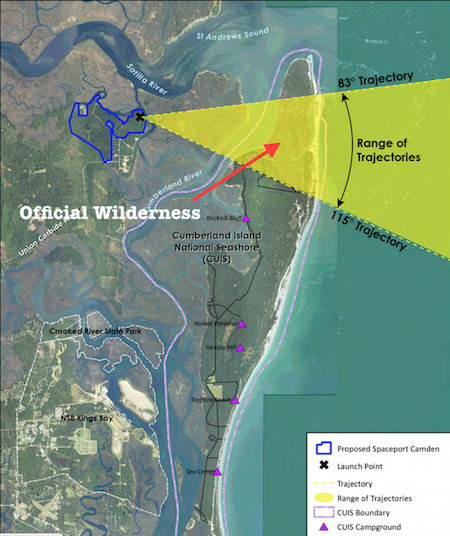
The trajectory cone contained in the draft EIS shows how much of the national seashore would lie beneath the path of rockets/FAA
An announcement expected Monday on whether a commercial spaceport can be located near Cumberland Island National Seashore in Georgia likely will just be the latest chapter in the long-running quest by county officials to develop the facility, as Federal Aviation Administration officials already are saying their ruling won't be the final step in the matter.
Reading between the lines of a letter FAA sent to Interior Department officials last week, it sounds like the FAA is not ready to deny the project the necessary permits to move forward. In that letter, FAA officials wrote that even if they approve a license for the spaceport proposed to be built in Camden, Georgia, "it would not authorize a single launch.”
“Simply put: to obtain a Vehicle Operator License, many more reviews remain, and no outcome is guaranteed,” the letter stated.
The Camden County Board of Commissioners has been trying for several years to gain FAA approval to build the spaceport 4-5 miles west of the national seashore on more than 4,000 acres once owned by Union Carbide.
While the FAA planned to announce its decision on the spaceport Monday, a Camden County judge is expected to rule sometime this week on whether to block the county from buying land for the facility before county residents can vote on the project. Nearly 4,000 county residents have signed petitions asking for a referendum on the spaceport.
"County Attorney John Myers told (Superior Court Judge Stephen G. Scarlett) that the nearly 4,000 citizens that signed petitions are just a small group that’s opposing the Spaceport Camden," opponents organized as Taxpayers Against Camden Spaceport said on their Facebook page. "He wanted the judge to disregard our constitutional right to vote on our commissioners' desire to saddle our grandchildren with owning the Union Carbide property forever."
Accessible only by boat, the national seashore features unspoiled beaches and dunes, marshes, and freshwater lakes, along with historic sites. Twisting live oaks covered in resurrection ferns and spanish moss make up the island's maritime forest, shading an understory of sable palms and palmettos. Facing the mainland, the island gazes across mudflats during low tide and swaying marshes.
Concerned onlookers, which range from the National Park Service to private landowners on Little Cumberland Island at the northern end of the national seashore as well as Camden County taxpayers who see the spaceport as a tremendous waste of taxpayer dollars, have a range of fears.
There's the possibility of rockets failing in launch and crashing down on the seashore or Little Cumberland Island; air quality concerns; noise pollution; hazardous wastes; and logistical impacts to the seashore staff.
With the flight path passing over the seashore's wilderness area, would backcountry travelers have to be banned during launch windows? What would the Park Service's responsibility be in terms of keeping people out of the area below the flight path? How would the seashore be impacted by "a catastrophic failure"?
"Such a failure or mishap could have long-term effects on the island, potential impairment to the island's natural and cultural resources, and major consequences for enjoyment of the island by future generations," the Park Service said in its initial comments to the proposal, a list that ran to nearly three dozen concerns.

 Support Essential Coverage of Essential Places
Support Essential Coverage of Essential Places




Comments
Is there a link to the letter referenced?
Go to www.spaceportpetition.org for details about the environmental hazards inherent in the launch site itself. The spaceport petition at that site is for Camden County, Ga. residents only, but read the details about the risks to Cumberland Island from possible chemical and Vietnam-era munitions and unexploded ordnance. The buried chemicals include Methyl Isocyante (MIC) and arsenic used to make pesticides. An accidental release of MIC in 1984 in India killed 2,500 Indians in one night. The spaceport site was using and disposing of MIC onsite as recently as 2012 yet is not included in the Final EIS. Cumberland Island National Seashore Wilderness includes thousands of acres reserved by Congress as Potential Wilderness in 2004 that lies between the spaceport and CUIS. The use of CUIS land and tidewater resources as a Launch Trajectory Hazard Zone violates the intent and purpose of Wilderness Act designations. The spaceport imposes NEW, non-conforming use as a rocket trajectory hazard zone in direct violation of DOI/NPS management obligations. More: www.spaceportfacts.org
Mather,
We've reached out to Interior asking for a copy of the letter. If they provide it, we'll post it.
Kurt
Season's Greetings, I am writing to show my support for 4000 residents of Great State of Georgia opposing the landgrab for the Spaceport. I Agree with Honorable Judge Scarlett's decision.